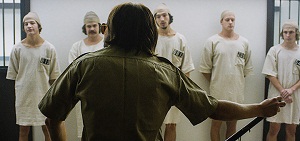Power Can Turn Human Beings Into Monstersby Jeffrey TuckerDec. 31, 2015 |
Popular 
Eloy Adrian Camarillo, 17, Arrested in Shooting Death of Infowars Reporter Jamie White

NYT: Trump Ended War With Houthis After They Shot Down U.S. Drones, Nearly Hit Fighter Jets

Ben Shapiro, Mark Levin and Laura Loomer Warn of Foreign Influence... From Qatar

Trump Advisor to Washington Post: 'In MAGA, We Are Not Bibi Fans'

Trump Cut Off Contact With Netanyahu Over 'Manipulation' Concerns, Israeli Reporter Claims
  The most revealing film I've seen this year is "The Stanford Prison Experiment." I highly recommend that you see it. Everyone should. If we took its lessons seriously, we would rethink more than just our prison system. We would rethink the whole system of government that has vexed humanity for thousands of years. The most revealing film I've seen this year is "The Stanford Prison Experiment." I highly recommend that you see it. Everyone should. If we took its lessons seriously, we would rethink more than just our prison system. We would rethink the whole system of government that has vexed humanity for thousands of years.If I had learned about this experiment in college, I had since forgotten about it. The experiment demonstrates the extent to which a title and an institutional context fundamental affects our perceptions of ourselves, and how quickly we adapt our assigned roles of master vs. subject. The experiment pertained to prison roles but it applies to the whole of life. The film tells the true story of the experiment conducted in 1971 by psychologist Philip Zimbardo. He gathered a group of 15 paid volunteers to be assigned the role of either prisoner or guard, and set up a fake prison in the basement of college building. The roles were assigned by a coin toss. What happened next is terrifying and revealing. Within the first day, the guards, who have only been told to maintain control but with no specifics beyond being instructed to not to use physical violence, become psychologically and physically abusive. You can see them warming up to the role very quickly. The prisoners too adapted to their new role, even taking on a new identity and losing a sense of their own personalities. A priest comes to evaluate them and finds that the prisoners only refer to themselves by their numbers. As you watch, and the morality and sanity of the scene begins to decline, the viewer has a deep sense of alarm, though you both understand and expect the results. The descent into the depths happens so rapidly, though, and so when the film announces the end of day one, you have to be startled. How could things go so wrong so fast? The experiment was supposed to last two weeks. What could happen next? The guards, determined only to control the prisoners, resort to quasi-torture to elicit compliance. They set up rooms for privileged people and rooms for punished people. They hoped for a dynamic whereby prisoners aspire to move from one to the other. What they got was a series of psychological breakdowns, deep depression, panic, terror, and a general atmosphere for freaking out. It was so bad, and fearing legal trouble, that the psychologist ended the experiment after only 6 days. It just couldn't go on. The psychologist himself even found himself drawn in, playing the role of the prison supervisor and tolerating far more humiliating abuse than he should have. It was only once his girlfriend intervened with a dose of reality that he snapped out of it. Experiments such as these are now banned by the profession because they are considered unethical. They probably are but it is a shame that we lack the ability to reproduce their results. This study, together with the famous Milgrim study, tell us more about human nature than we are often willing to acknowledge. The study reminded me of the last time I was in jail for a few hours. I had been snagged in a bureaucratic foul up over a traffic ticket. I stood there behind bars just amazed at how much injustice in one day was being perpetuated by the guards. Without exception, they repeated the phrase "just doin' my job" as a way of justifying their behavior. I asked my jail mate why those monsters were out there and we were in here. "They are lucky and we are unlucky," came his response. Truer words.... How much does prison, and the power of being a prison guard, transform a person? It can turn a sweet student into a tyrannical despot in less than a day. That's the message I took from the experiment. None of us are above it. Power over others is the evil golden ring, something that reaches deep within the darkest regions of our soul to find the foulest of all longings and bring them to the surface. Power is such a corrupting force in the human heart that it can overcome the best intentions, the most earnest ethical training, the strongest faith in transcendence, and even the meekest of temperaments. Power is the devil that destroys all that is good and puts pure malice in its place. The replacement of power is a human priority for peace and well being. That's the lesson of the Stanford Prison Experiment. But it's not the only lesson. Even in the absence of power, humane cooperation between people requires something else: opportunities to value each other as human beings. This is the glorious gift that commerce gives society. It helps us find value in each other and inspires others to find value in us. In the prison experiment, there was no commerce. It didn't run long enough for "corruption" to emerge such that guards and prisoners trade favors. It was a setting devoid of opportunities for exchange. That created the strangest of things: a mini society without a shred of dignity that quickly devolved into pure exploitation of man by man. The lesson, then, is not just about the ghastliness of prison life. It is about the big and small horrors of all life where exchange is absent and relationships are governed solely by the control of some by others. If we applied this lesson consistently, the world would look very different indeed. Coda: The New Yorker offers an article that recounts another experiment with slightly different results, and I approve of the author's conclusions here: "The lesson of Stanford isn't that any random human being is capable of descending into sadism and tyranny. It's that certain institutions and environments demand those behaviors--and, perhaps, can change them." _ Jeffrey Tucker is Chief Liberty Officer of Liberty.me (http://liberty.me/join), a subscription-based, action-focused social and publishing platform for the liberty minded. He is also distinguished fellow Foundation for Economic Education (http://fee.org), executive editor of Laissez-Faire Books, research fellow Acton Institute, founder CryptoCurrency Conference, and author six books. He is available for speaking and interviews via tucker@liberty.me |



